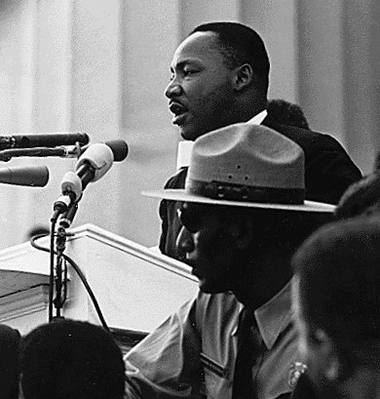MLK: Embrace his vision

The news broke like a bomb shell. About 7pm on April 4, 1968, I heard that Martin Luther King, Jr. had been shot in Memphis. Minutes later, the group I was with heard that Dr. King was dead. I wept. I could not fathom that an iconic civil rights leader, an advocate for blacks and the poor, an opponent of the Vietnam War, and the winner of the Nobel Peace Prize, had been taken from us in an instant.
King was 39. This month, he would have been 86. And I still wonder today how the history of our nation might have been different if he had not been shot that warm spring night. Would we be closer to equality for all? Would we have done more to stamp out poverty? Would the division in our country and our government not have been as extreme?
I don’t know the answers to those questions. But I do know this: Dr. King’s vision for America was revolutionary. He knew that “racism, poverty, militarism and materialism” are inextricably joined. They were in 1968, and if anything, are more so today. He said, “The black revolution is much more than a struggle for the rights of Negroes. It is forcing America to face all its interrelated flaws—racism, poverty, militarism, and materialism. It is exposing evils that are rooted deeply in the whole structure of our society...and suggests that radical reconstruction of society is the real issue to be faced.”
King would be appalled at the state of education today. Many school districts, after abandoning busing to promote integration, are heavily segregated. According to the Association for Supervision and Curriculum Development (ASCD), an organization for school superintendents, principals, teachers and other educators, “Social and economic disadvantage—not only poverty, but also a host of associated conditions—depresses student performance. Concentrating students with these disadvantages in racially and economically homogenous schools depresses it even further.” The combination of poverty and segregated schools would almost certainly be at the center of Dr. King’s focus.
The reason Dr. King was in Memphis in 1968 was to help the city’s sanitation workers in their prolonged strike for a living wage. Poverty was becoming an important part of his portfolio. King and others were planning a “Poor People’s Campaign” for later in the year, to address issues of economic justice. The nation’s poverty rate has fallen only modestly from 19 percent in 1964, when President Johnson’s ‘War on Poverty’ began, to 15 percent in 2012. Ten percent of Whites, 27 percent of Blacks, and 24 percent of Hispanics live below the federal poverty level.
King would also be in the middle of the immigration issue, since it is basically poverty driven. People from poor countries, with no opportunity, come to the US any way they can, to better their family’s lot in life. Their undocumented status is often used to pay them sub-minimum wage, with no benefits, and the always present threat of deportation. He could not look at the poverty in our country, and our refusal to address it, and remain silent.
An early opponent of the Vietnam War, King would no doubt be alarmed that 50 years later, the US military budget is larger than the next ten countries combined: China, Russia, UK, Japan, France, Saudi Arabia, India, Germany, Italy, and Brazil. He viewed military spending as a drain on social programs to help the disadvantaged in America.
Martin Luther King, Jr., was a revolutionary, a visionary, a social democrat, an American, and a citizen of the world. Today, January 19, we pause to remember him on the holiday dedicated to him. But more importantly, for our own future and that of our nation, we should each embrace his vision for America, and take whatever action we can to move our country forward toward equality, justice, and the elimination of poverty.
By Rob Howard, Politcal Columist
The Gayly – January 19, 2015 @ 6:30am.





